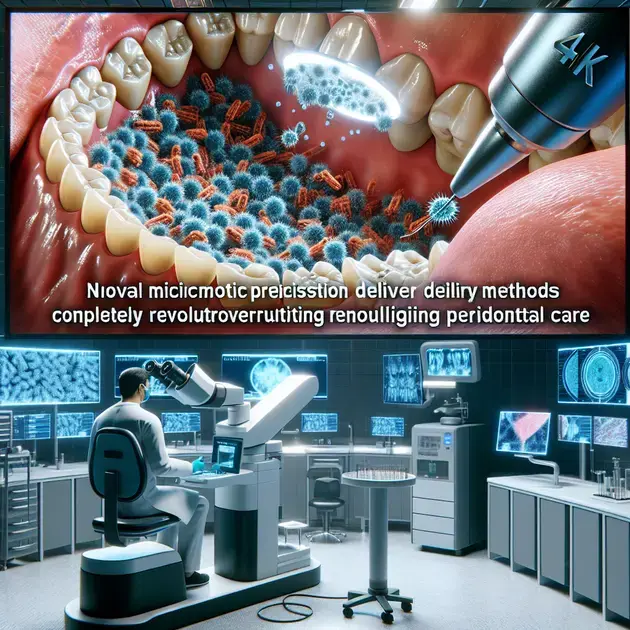Periodontitis is a severe gum infection that damages the soft tissue and destroys the bone supporting your teeth. Without proper treatment, periodontitis can lead to tooth loss and other health complications. In this comprehensive guide, we will explore the most effective medication options available for managing periodontitis.
Recent studies have shown that the use of antibiotics in combination with scaling and root planing can significantly improve treatment outcomes for periodontitis. These medications can help reduce inflammation, control bacterial infections, and promote the healing of gum tissue. By understanding the different medication options and their benefits, you can make informed decisions about your periodontal health.

Effective Medication Options for Periodontitis Treatment
When it comes to treating periodontitis, there are several effective medication options available. One common medication is chlorhexidine, which is a topical antiseptic that can help reduce bacteria in the mouth. You can easily find this over-the-counter mouthwash at most pharmacies or online retailers. To use chlorhexidine, simply rinse your mouth with the solution for about 30 seconds twice a day after brushing your teeth.
Another effective medication for periodontitis is doxycycline, which is an antibiotic that can help reduce inflammation and infection in the gums. This medication is usually prescribed by a dentist or periodontist and comes in the form of a pill. Make sure to follow your healthcare provider’s instructions on how to take this medication and for how long.
For more severe cases of periodontitis, a dentist may recommend systemic antibiotics such as amoxicillin or metronidazole. These antibiotics are typically prescribed for a short period to combat the bacterial infection causing the gum disease. It’s important to take these medications as directed and to complete the full course of treatment.
In addition to medications, it’s essential to maintain good oral hygiene practices such as regular brushing, flossing, and professional dental cleanings. These habits, combined with the right medication, can help effectively treat periodontitis and improve the health of your gums.
Overall, the key to successful treatment of periodontitis is a combination of proper medication and thorough oral care. By following your dentist’s recommendations and staying consistent with your treatment plan, you can effectively manage and improve the symptoms of periodontitis.
Understanding Antibiotics in Periodontal Therapy
Antibiotics play a crucial role in periodontal therapy by helping to combat the bacterial infection that causes gum disease. One common antibiotic used in periodontal treatment is metronidazole, which works by targeting specific bacteria in the mouth. Your dentist may prescribe metronidazole in combination with other antibiotics for a more comprehensive treatment approach.
Another antibiotic often used in periodontal therapy is penicillin, which helps to eliminate harmful bacteria and reduce inflammation in the gums. This antibiotic is typically prescribed for a short period and may be part of a broader treatment plan that includes scaling and root planing to remove plaque and tartar from the teeth and gums.
It’s important to note that antibiotics are not always the sole solution for treating periodontal disease. They are usually prescribed in conjunction with other therapies to achieve the best results. Your dentist will determine the most appropriate antibiotic regimen based on the severity of your gum disease and your overall health.
When taking antibiotics for periodontal therapy, it’s essential to follow your dentist’s instructions carefully and to complete the full course of medication. Failure to do so can lead to antibiotic resistance and reduced effectiveness in future treatments. Always communicate with your dentist about any concerns or side effects you may experience while taking antibiotics.
By understanding how antibiotics work in periodontal therapy and following your dentist’s recommendations, you can effectively combat gum disease and improve the health of your gums.
Benefits of Medications in Managing Periodontal Infections
Medications play a significant role in managing periodontal infections by targeting the underlying causes of gum disease and reducing inflammation in the gums. One of the primary benefits of medications in treating periodontal infections is their ability to reach and eliminate bacteria in hard-to-reach areas of the mouth that brushing and flossing alone may not effectively address.
Topical medications such as antimicrobial mouthwashes can help reduce plaque buildup and bacteria in the mouth, promoting healthier gums and preventing further infection. These mouthwashes are easy to use and can be incorporated into your daily oral hygiene routine for added protection against periodontal infections.
In cases where periodontal infections are more severe, systemic medications like antibiotics may be necessary to combat the bacterial infection. These medications work internally to target bacteria throughout the body, including the gums, and can be prescribed for short-term use to alleviate acute symptoms and prevent the spread of infection.
Another benefit of medications in managing periodontal infections is their role in reducing pain and discomfort associated with gum disease. By targeting inflammation and infection, medications can help alleviate symptoms such as swelling, redness, and bleeding gums, making it easier to maintain good oral hygiene practices and prevent further complications.
Overall, medications can be highly beneficial in managing periodontal infections when used in conjunction with proper oral hygiene and professional dental care. By understanding the benefits of medications and following your dentist’s treatment plan, you can effectively control and improve the symptoms of periodontal disease for better oral health.

Effective Medication Options for Periodontitis Treatment, Explained
Periodontitis is a serious gum infection that can lead to major health issues if left untreated. One effective medication option for treating periodontitis is antibiotic therapy. Antibiotics can help to eliminate the bacteria causing the infection and reduce inflammation in the gums. Common antibiotics used for periodontitis treatment include doxycycline, minocycline, and metronidazole.
Another effective medication option is antimicrobial mouth rinses. These rinses can help to reduce plaque and bacteria in the mouth, promoting gum health and preventing further infection. Chlorhexidine is a commonly used antimicrobial mouth rinse that has been shown to be effective in treating periodontitis.
In some cases, local antibiotic delivery may be recommended. This involves the placement of antibiotic agents directly into the pockets of the gums where bacteria thrive. This targeted approach can help to effectively treat the infection and promote gum healing.
Surgical options, such as antibiotic-coated sutures, may also be considered for severe cases of periodontitis. These sutures slowly release antibiotics into the gums, providing continuous protection against infection during the healing process.
Overall, effective medication options for periodontitis treatment play a crucial role in managing the infection and promoting gum health. It is important to follow your dentist’s recommendations and complete the full course of medication to ensure successful treatment.
Rethinking Traditional Approaches to Antibiotics in Periodontal Care
Traditional approaches to antibiotics in periodontal care have focused on systemic administration, such as oral tablets or capsules. While this can be effective in treating periodontal infections, there are limitations to this approach, including potential side effects and antibiotic resistance.
One innovative strategy that is rethinking traditional approaches is localized antibiotic therapy. This method involves the direct application of antibiotics to the infected gum tissue, targeting the bacteria at the source. This can result in more effective treatment with lower doses of antibiotics, reducing the risk of side effects.
Another approach is the use of probiotics to promote oral health. Probiotics are beneficial bacteria that can help to balance the oral microbiome, reducing the growth of harmful bacteria that cause periodontal infections. Incorporating probiotics into periodontal care can provide a natural and sustainable way to support gum health.
Furthermore, advancements in nanotechnology have led to the development of antimicrobial nanoparticles that can target and eliminate bacteria in the gums. These innovative nanoparticles offer a precise and effective way to combat periodontal infections without the need for traditional antibiotics.
By rethinking traditional approaches to antibiotics in periodontal care and embracing innovative strategies, dental professionals can provide patients with more targeted and effective treatment options for managing periodontal infections.
Innovative Strategies for Enhancing Medication Delivery in Periodontal Treatment
Enhancing medication delivery in periodontal treatment is key to improving the effectiveness of treatment and promoting better patient outcomes. One innovative strategy for enhancing medication delivery is the use of periodontal gels. These gels can be applied directly to the gums, providing a sustained release of medication over time.
Another approach is the use of drug-eluting implants placed directly into the gum tissue. These implants slowly release medication into the surrounding tissue, ensuring targeted delivery and prolonged efficacy. This method reduces the need for frequent applications and enhances patient compliance.
Nanotechnology plays a crucial role in enhancing medication delivery in periodontal treatment. By encapsulating medications in nano-sized particles, researchers can improve drug stability, bioavailability, and targeted delivery to the site of infection. This approach maximizes the therapeutic effects of the medication while minimizing side effects.
Furthermore, innovative devices, such as micro-needles and micro-pumps, are being developed to deliver medications directly into the gum tissue with precision and minimal discomfort. These devices offer a non-invasive and efficient way to enhance medication delivery for improved therapeutic outcomes.
Overall, incorporating innovative strategies for enhancing medication delivery in periodontal treatment can revolutionize the way periodontal infections are managed, leading to more effective treatment, faster healing, and improved patient satisfaction.
Conclusion
In conclusion, effective medication options for periodontitis treatment, such as antibiotic therapy, antimicrobial mouth rinses, local antibiotic delivery, and surgical options, play a vital role in managing the infection and promoting gum health. It is essential for individuals to adhere to their dentist’s recommendations and complete the full course of medication to ensure successful treatment and prevent further health issues.
Rethinking traditional approaches to antibiotics in periodontal care by embracing innovative strategies like localized antibiotic therapy, probiotics, and antimicrobial nanoparticles can provide more targeted and effective treatment options for managing periodontal infections. These approaches aim to minimize side effects, combat antibiotic resistance, and enhance overall patient outcomes in periodontal care.
Moreover, innovative strategies for enhancing medication delivery in periodontal treatment, including the use of periodontal gels, drug-eluting implants, nanotechnology, and advanced delivery devices, have the potential to revolutionize the management of periodontal infections. By improving drug stability, targeted delivery, and patient compliance, these strategies can lead to more effective treatment, faster healing, and increased patient satisfaction in periodontal care.



